Suk-in Chang. Modern Conversational Korean
Подождите немного. Документ загружается.

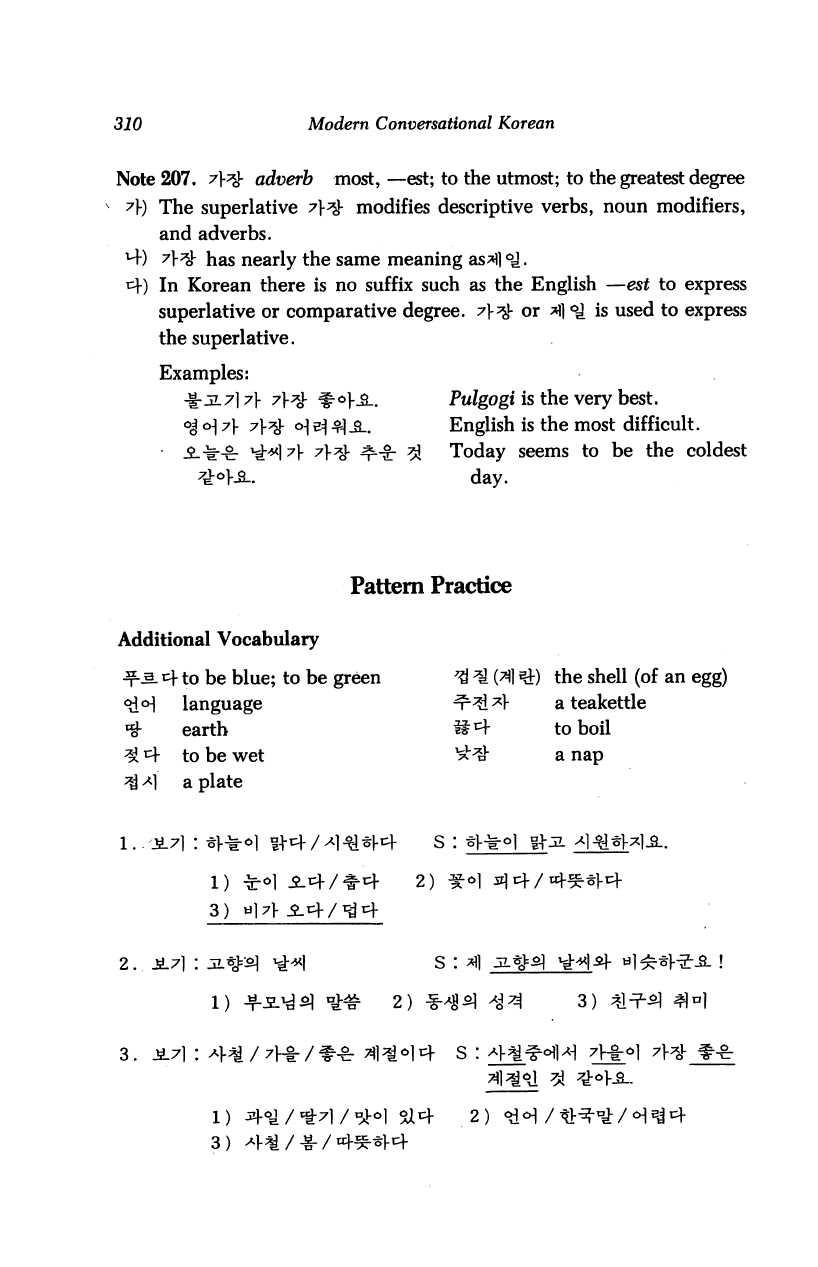
310
Modern
Conversational
Korean
Note
207.
7\?fr
adverb
most,
—est;
to
the
utmost;
to
the
greatest
degree
s
7\)
The
superlative
7}*$-
modifies
descriptive
verbs,
noun
modifiers,
and
adverbs.
M-)
7\7$r
has
nearly
the
same
meaning
as*fl
°i.
t+)
In
Korean
there
is
no
suffix
such
as
the
English
—est
to
express
superlative
or
comparative
degree.
7}^-
or
A
°£
is
used
to
express
the
superlative.
Examples:
-S-jL7]7V
7}&
^°}£-.
Pulgogi
is
the
very
best.
°j
°]
A
7\*&
o] &\
^)^_.
English
is
the
most
difficult.
Today
seems
to
be
the
coldest
day.
Pattern
Practice
Additional
Vocabulary
•f-aL4to
be
blue;
to
be
green
7$
^
(31
*£)
the
shell
(of
an
egg)
language
^^^1-
a
teakettle
earth
S^
to
boil
J^f
to
be
wet
^^
a
nap
-4
a
plate
l.
2.7}
:
^^-o]
n-cf/^i^«i-cf
s
:
l)
*oi
i4/*4
2)
^
3)
»]7
2
.
.
JL7l
I
3L^=2l
*i*|
S
:
1)
Jfi^d^
^
2)
*^5]
^^
3)
3.
jL7i
:
4^/7He/**
31*M4
s
:
1)
^^/*7l/^o]
^4
2)
3)
*MI/-g-/«*
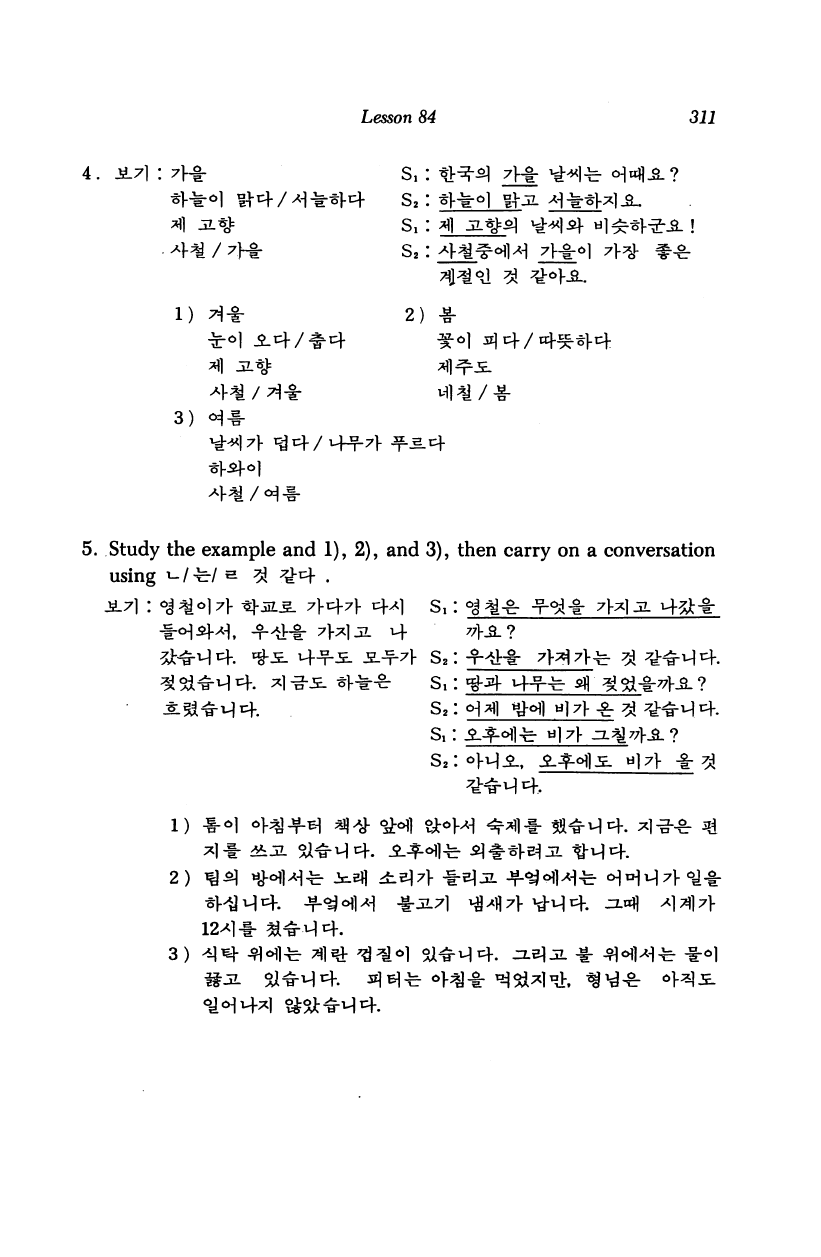
Lesson
84
311
4.
1)
t}-§-
.2.4/#4
3)
S,
S2
Si
S2
2)
-S-
»l
4/4**1-4
2)
3)
5.
Study
the
example
and
1),
2),
and
3),
then
carry
on
a
conversation
using
W-fe7
s
3J
^^f
.
S,
S2
S,
S2
S,
S2
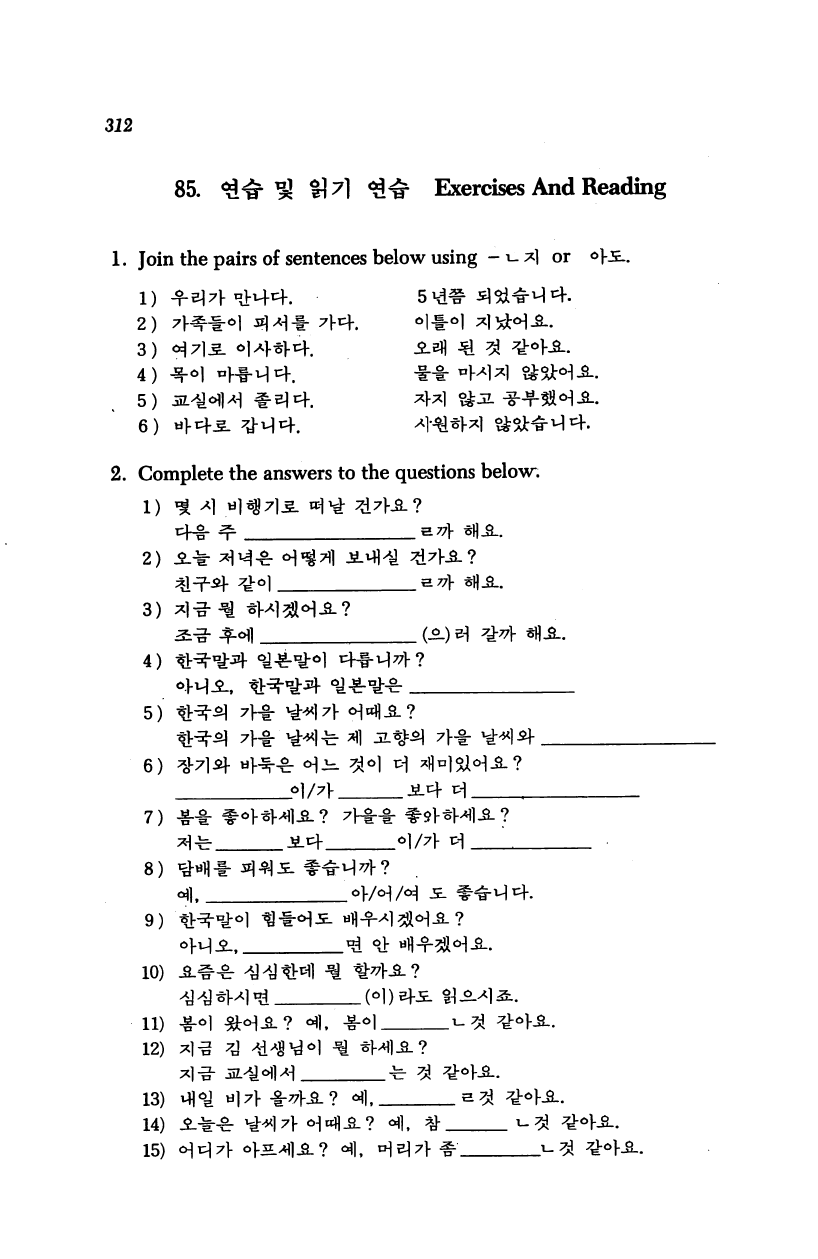
312
85.
<&&
^
H^]
*l^
Exercises
And
Reading
1.
Join
the
pairs
of
sentences
below
using
-t-^1
or
*}£..
2)
3)
4)
5)
6)
2.
Complete
the
answers
to
the
questions
below.
2)
3)
4)
5)
6)
7)
8)
9)
yjMi^
()
ti
^.
11)
1
12)
13)
^°A
*]?}
14)
15)
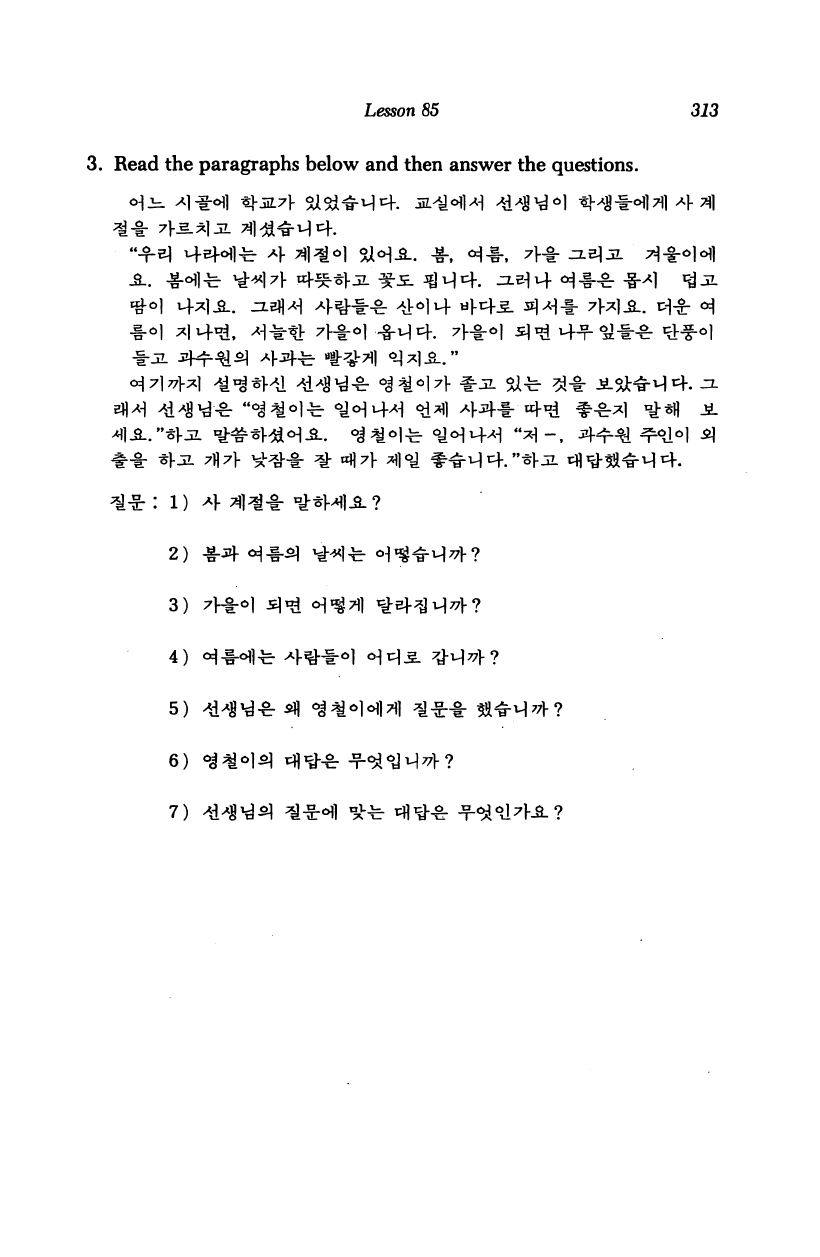
Lesson
85
313
3.
Read
the
paragraphs
below
and
then
answer
the
questions.
2)
3)
4)
5)
6)
7)
'S
SU-
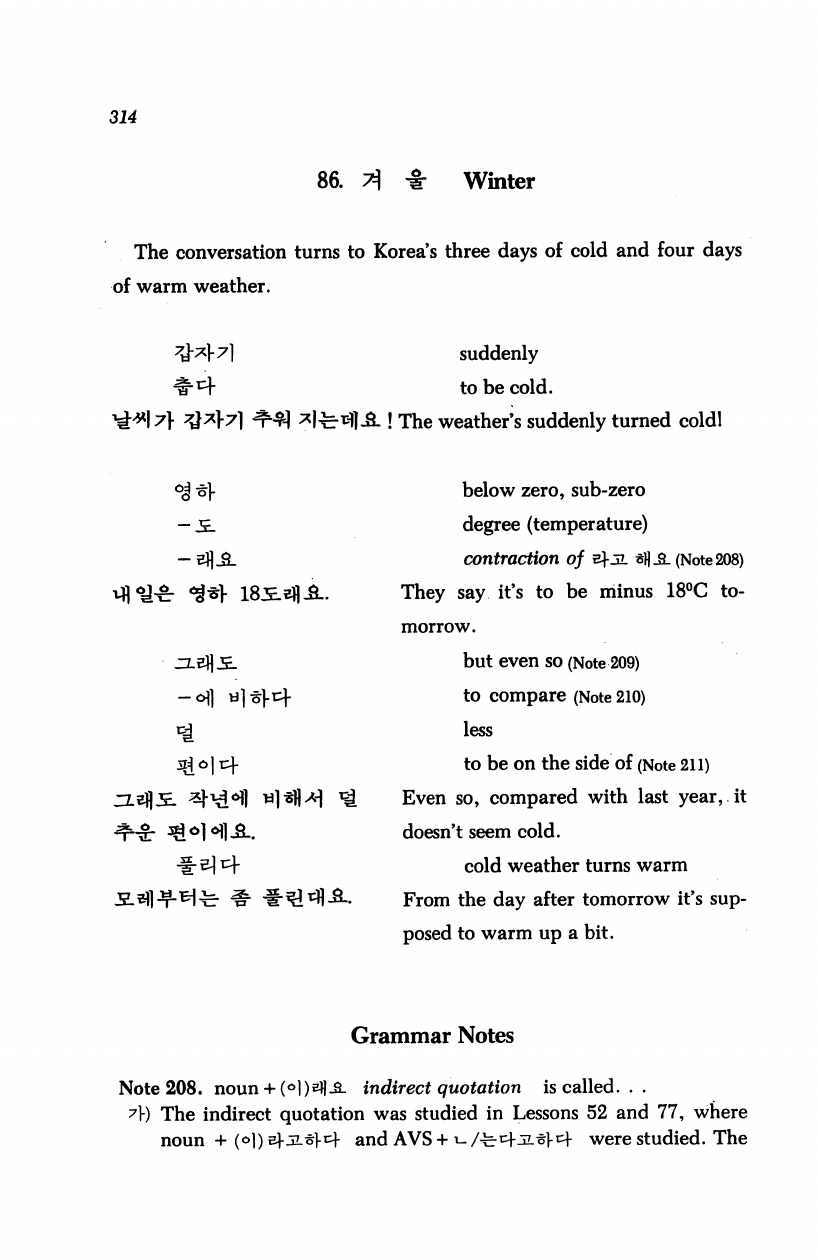
314
86.
^
-I-
Winter
The
conversation
turns
to
Korea's
three
days
of
cold
and
four
days
of
warm
weather.
suddenly
to
be
cold.
!
The
weather's
suddenly
turned
coldl
below
zero,
sub-zero
degree
(temperature)
contraction
of
b\-jl
sfl_a.
(Note
208)
They
say
it's
to
be
minus
18°C
to
morrow.
but
even
so
(Note
209)
to
compare
(Note
210)
less
to
be
on
the
side
of
(Note
211)
Even
so,
compared
with
last
year,
it
doesn't
seem
cold.
cold
weather
turns
warm
From
the
day
after
tomorrow
it's
sup
posed
to
warm
up
a
bit.
Grammar
Notes
Note
208.
noun
+
(6])efl-2_
indirect
quotation
is
called.
. .
A)
The
indirect
quotation
was
studied
in
Lessons
52
and
77,
where
noun
+
(°D
b}-5L-5\k\
and
AVS
+
i-
/^^-JL^l-tf
were
studied.
The
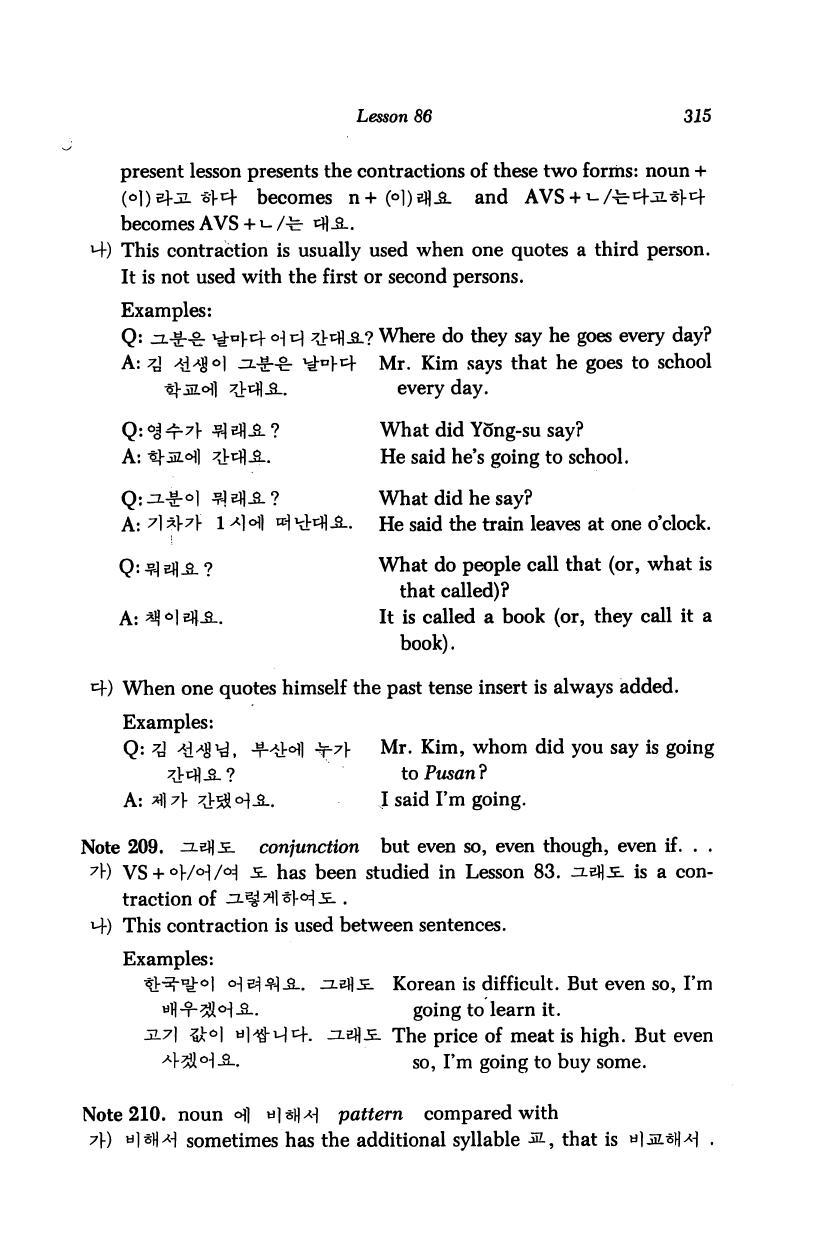
Lesson
86
315
present
lesson
presents
the
contractions
of
these
two
forms:
noun
+
(<^1)5^jl
«Vcf
becomes
n+(<>l)ej|.a-
and
AVS
+
^/t^jL^cf
becomes
AVS
+
*-/^r
*%&..
M-)
This
contraction
is
usually
used
when
one
quotes
a
third
person.
It
is
not
used
with
the
first
or
second
persons.
Examples:
Q:
jz-g-g-
^o).cf
o^
v]
^Vtfl.a.?
Where
do
they
say
he
goes
every
day?
A:
^
^8
°1
-3--S-&-
^A^
Mr.
Kim
says
that
he
goes
to
school
every
day.
Q:
°j
^-A
fl
AS-
?
What
did
Yong-su
say?
A:
*J-JiZ.cHl
^V^fl-S-.
He
said
he's
going
to school.
What
did
he
say?
A:
A
*\A
1
^1
°ti
tt1
Ht^fl-S-.
He
said
the
train
leaves
at
one
o'clock.
Q:
j?]
Efl^.
?
What
do
people
call
that
(or,
what
is
that
called)?
A:
*q
°1
eH-B..
It
is
called
a
book
(or,
they
call
it
a
book).
When
one
quotes
himself
the
past
tense
insert
is
always
added.
Examples:
Q:
7A
AAA$^,
-T-^t^l
-t-71"
^r#
Km1?
whom
did
you
say
is
going
^Viq]^.?
to
Pusan?
A:
*fl
A
^i-^o^
JL.
I
said
I'm
going.
Note
209.
^2-eflJE-
conjunction
but
even
so,
even
though,
even
if.
. .
A)
VS
+
°}/°]/ol
5-
has
been
studied
in
Lesson
83.
3L&ft5-
is
a
con
traction
of
-IL^Til^H^-.
*+)
This
contraction
is
used
between
sentences.
Examples:
^V^-ty-o]
o-]^^|_a_.
jxsfli.
Korean
is
difficult.
But
even
so,
I'm
wti-T-2M-2-.
going
to
learn
it.
3-7]
3JM
til^-M^-.
^.efl^-
The
price
of
meat
is
high.
But
even
-43Jl<H-3L.
so,
I'm
going
to
buy
some.
Note
210.
noun
°\]
til^x-)
pattern
compared
with
7\)
a]
siH
sometimes
has
the
additional
syllable
&-,
that
is
«
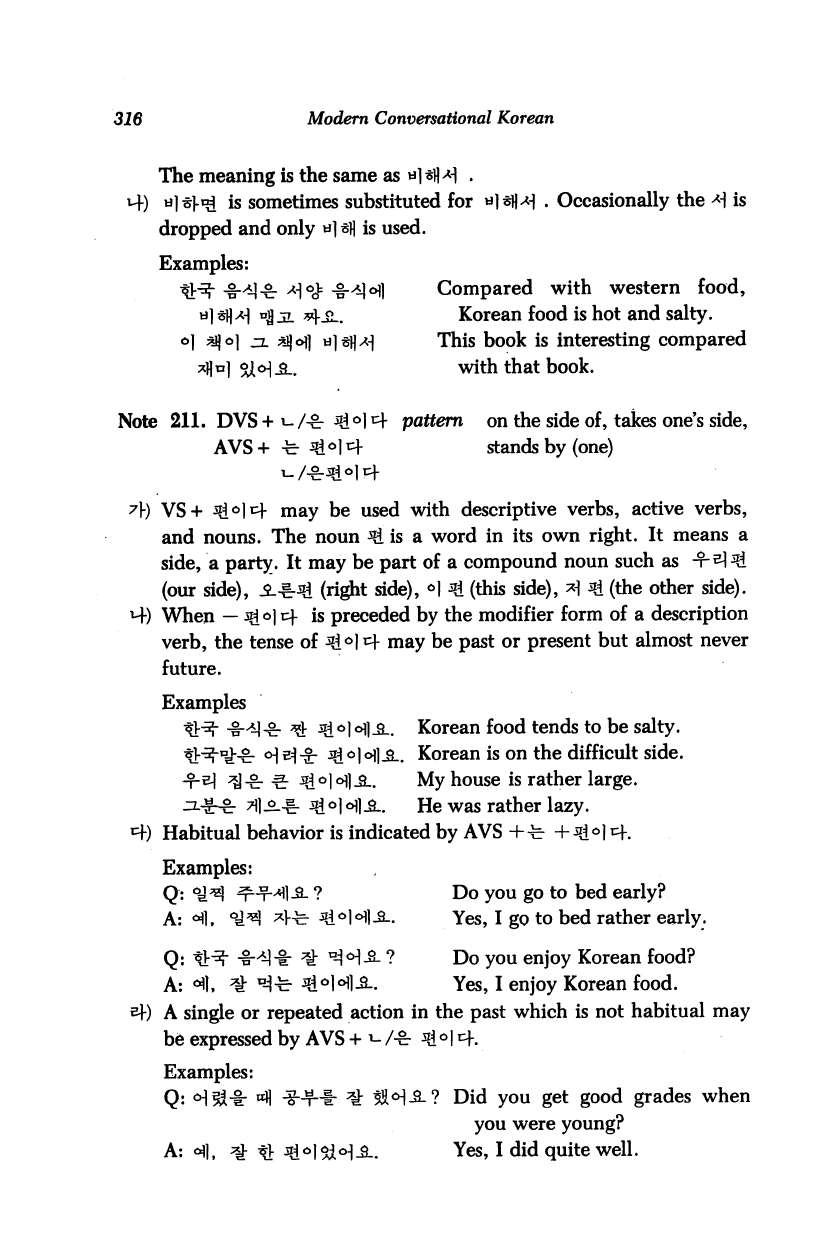
316
Modern
Conversational
Korean
The
meaning
is
the
same
as
*]
sM
.
uf)
*]-s}t£
is
sometimes
substituted
for
a]*}W
.
Occasionally
the
-*)
is
dropped
and
only
*]
sfl
is
used.
Examples:
^j.^-
-%-*)£.
a\<#
-§-^]ofl
Compared
with
western
food,
u]
s]]^
og
jl
^iL.
Korean
food
is
hot
and
salty.
o]
^o\
jl
*$6\]
*]tf\A]
This
book
is
interesting
compared
*fl
n]
°j
o-]
_a..
with
that
book.
Note
211.
DVS
+
i-/-8r
3i°l4
pattern
on
the
side
of,
takes
ones
side,
AVS
+
-fe-
3£°]
e+
stands
by
(one)
VS+
^<=>]^
may
be
used
with
descriptive
verbs,
active
verbs,
and
nouns.
The
noun
^
is
a
word
in
its
own
right.
It
means
a
side,
a
party.
It
may
be
part
of
a
compound
noun
such
as
-t-^^
(our
side),
JL-^d
(right
side),
*|
3i
(this
side),
*1
3i
(the
other
side).
When
—
3go]
14
is
preceded
by
the
modifier
form
of
a
description
verb,
the
tense
of
^l
i=f
may
be
past
or
present
but
almost
never
future.
Examples
Korean
food
tends
to
be
salty.
Korean
is
on
the
difficult
side.
My
house
is
rather
large.
He
was
rather
lazy.
Habitual
behavior
is
indicated
by
AVS
+-fc-
+
Jg<>|
cf.
Examples:
Q:
OJ^!
^-t-4-S-
?
Do
you
go
to
bed
early?
A:
°fl,
^^!
^V^
^^HI-Sl.
Yes,
I
go
to
bed
rather
early.
Q:
*^-
^-^-1:
^
u-i<H-S-
?
Do
you
enjoy
Korean
food?
A:
«fl,
^
^-fe-
^^Hl-^-.
Yes,
I
enjoy
Korean
food.
A
single
or
repeated
action
in
the
past
which
is
not
habitual
may
be
expressed
by
AVS
+
W*
*
°
I
*+.
Examples:
Q:
oJl^-i-
«fl
iHHb
^
SW-3-? Did
you
get
good
grades
when
you
were
young?
A:
<^|,
^g-
^t
^I^M-SL
Yes,
I
did
quite
well.
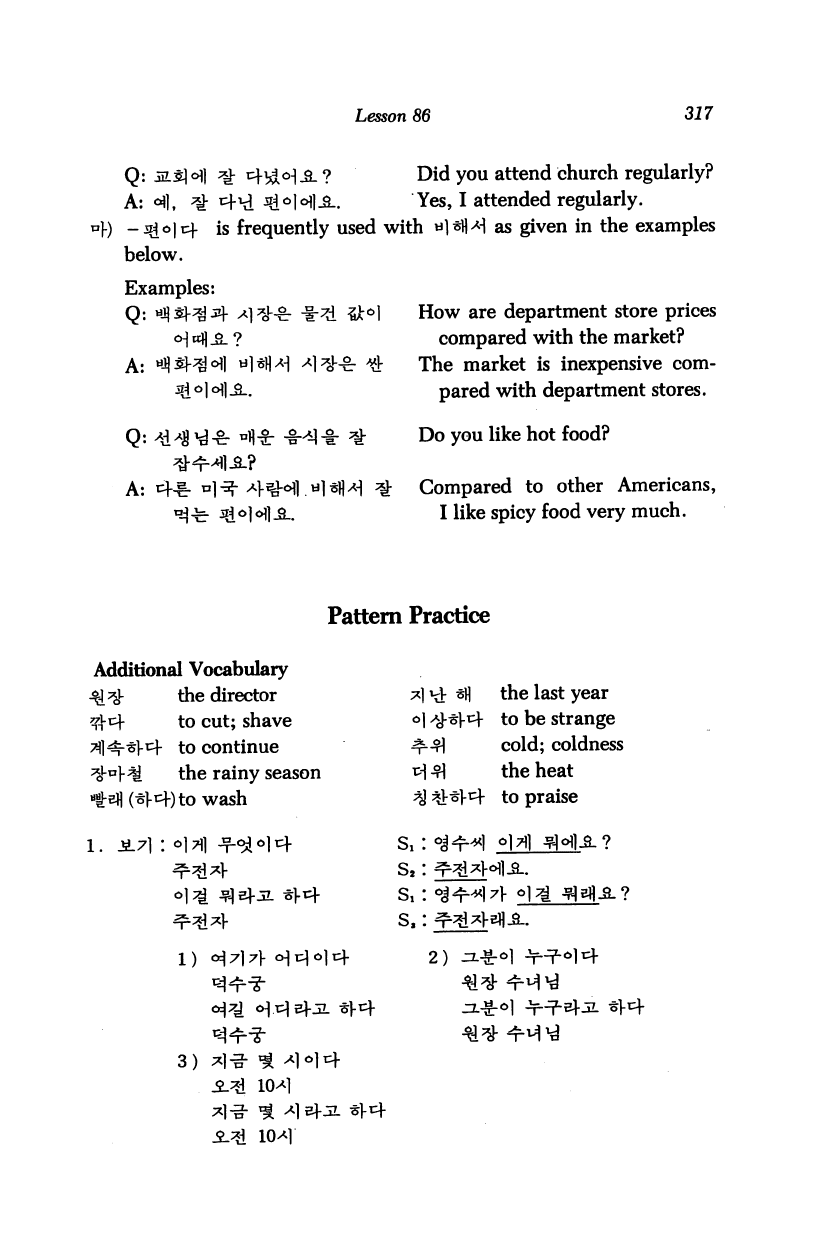
Lesson
86
317
Q:
A:
<A],
below.
Examples:
Q:
A:
Did
you
attend
church
regularly?
i+\l
3ijo|cHl^..
Yes,
I
attended
regularly,
is
frequently
used
with
*1*N>M
as
given
in
the
examples
A:
How
are
department
store
prices
compared
with
the
market?
The
market
is
inexpensive
com
pared
with
department
stores.
Do
you
like
hot
food?
Compared
to
other
Americans,
I
like
spicy
food very
much.
Pattern
Practice
Additional
Vocabulary
the
director
to
cut;
shave
to
continue
the
rainy
season
wash
1.
JL71
:
1)
3)
o|
S,
:
s2:
s,:
s,:
2)
the
last
year
to
be
strange
cold;
coldness
the
heat
to
praise
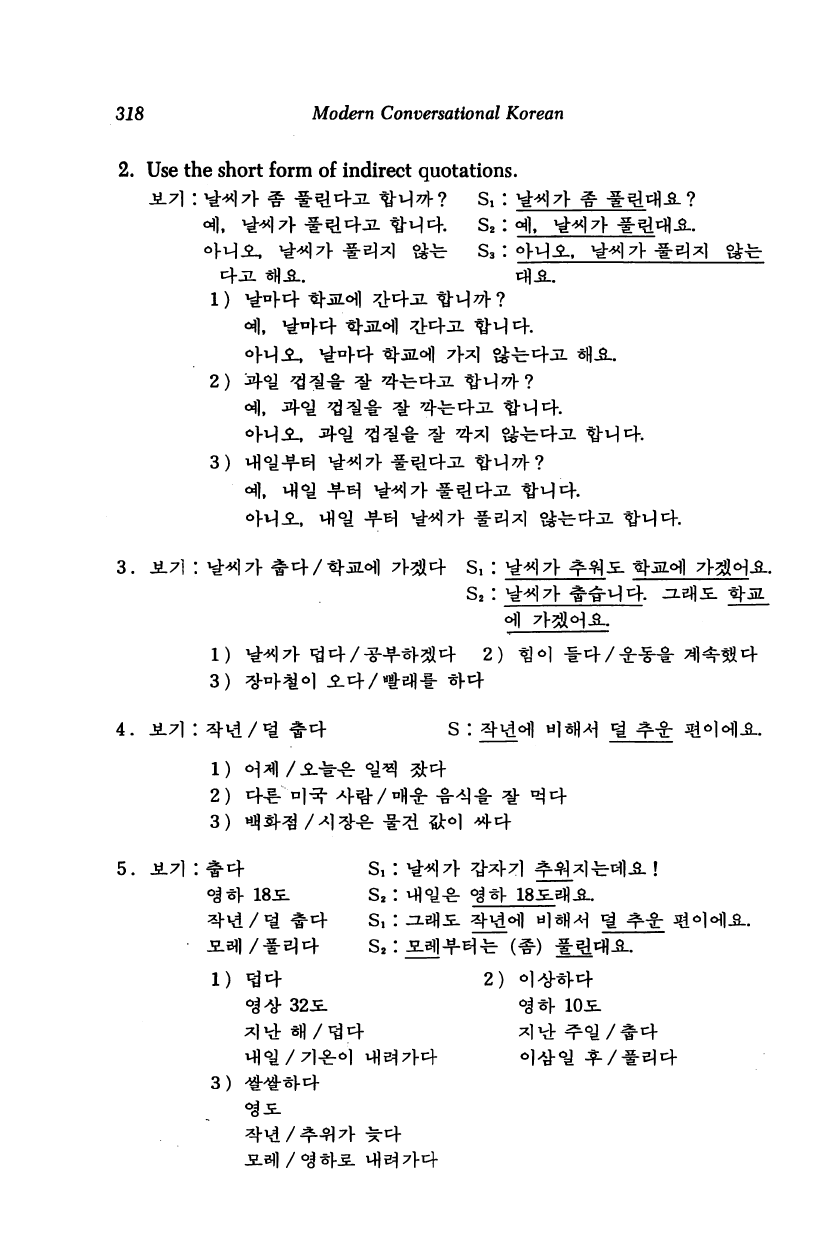
318
Modern
Conversational
Korean
1)
"fl,
2)
SHI
3)
3)
2)
4*
3)
3)
2.
Use
the
short
form
of
indirect
quotations.
.
s2
s,
S,
s,
s,:
s2:
2)
s
:
-fr-M-t-
(#)
2)
10S.
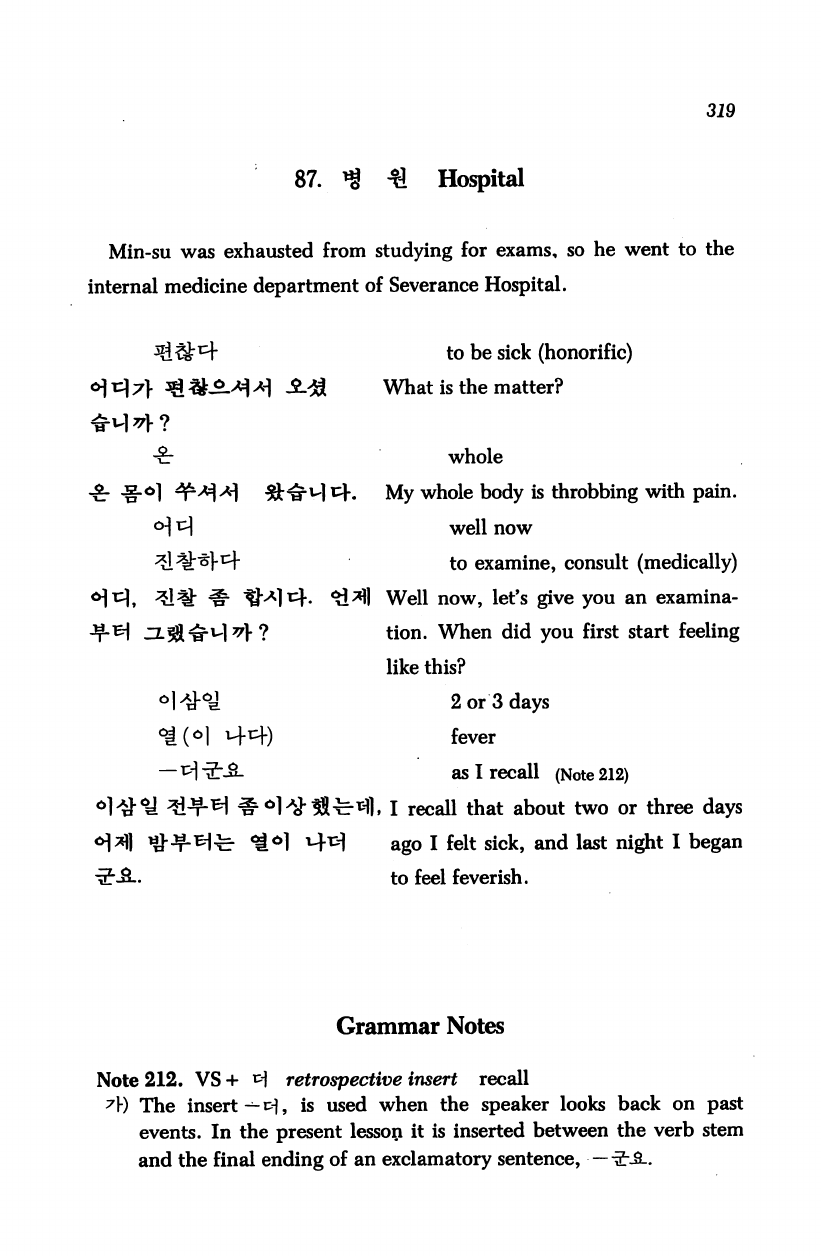
319
87.
^
^
Hospital
Min-su
was
exhausted
from
studying
for
exams,
so
he
went
to
the
internal
medicine
department
of
Severance
Hospital.
to
be
sick
(honorific)
What
is
the
matter?
whole
My
whole
body
is
throbbing
with
pain.
well
now
t0
examine,
consult
(medically)
Well
now,
let's
give
you
an
examina-
tion.
When
did
you
first
start
feeling
like
this?
2
or
3
days
fever
as
I
recall
(Note
212)
,
I
recall
that
about
two
or
three
days
ago
I
felt
sick,
and
last
night
I
began
to
feel
feverish.
Grammar
Notes
Note
212.
VS
+
tf
retrospective
insert
recall
7\)
The
insert-1-^,
is
used
when
the
speaker
looks
back
on
past
events.
In
the present
lesson
it is
inserted
between
the
verb
stem
and
the
final
ending
of
an
exclamatory
sentence,
■
—-£JL.
